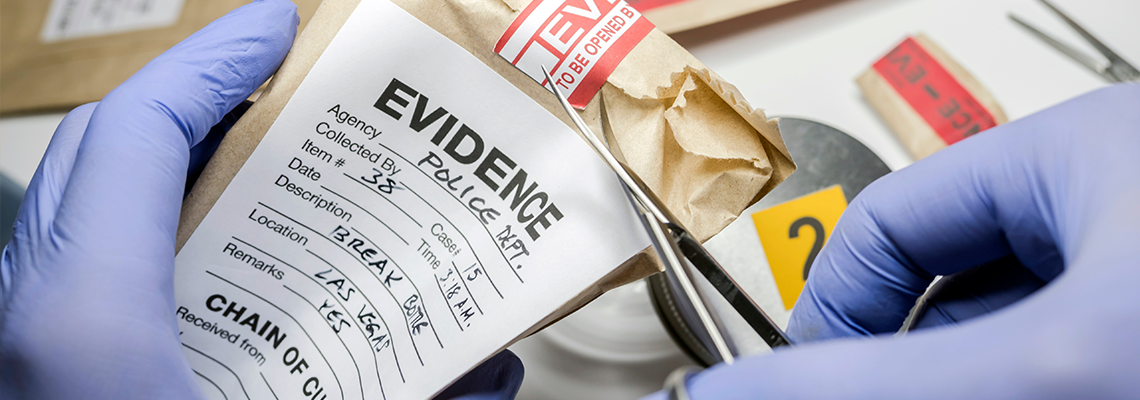
UNDERSTANDING EVIDENCE
IN A CRIMINAL TRIAL
Regardless of whether or not criminal charges have been officially handed down, many people are familiar with the phrase "beyond a reasonable doubt." This phrase is formally known in legal terms as “presumption of innocence.” This principle means that any individual charged with a crime is assumed to be innocent until they have been conclusively proven guilty in a court of law.
If you are facing criminal charges and want to know more about what evidence can be presented in a trial, speaking with a skilled criminal defense attorney is important. Even if the evidence is stacked against you, a knowledgeable criminal defense attorney will work to uphold your rights and determine what evidence can be used to prove — or disprove — key facts of your case. At Wolfe & Mote Law Group, LLC, the attorneys have the experience, knowledge, and tools necessary to assist you in understanding evidence in a criminal trial.
Wolfe & Mote Law Group, LLC, proudly serves clients across Columbus, Ohio, and surrounding areas of Dublin, Westerville, Gahanna, and Hilliard.
What Is Evidence?
Evidence is any information or object presented in a trial to attempt to convince a judge or jury of an allegation or a specific point. Evidence can include:
Witness testimony
Written statements
Audio or video recordings
Photographs
Physical objects (clothing, weapons, documents)
Digital evidence, which can include both data and the media storing it
Scientific data (including blood tests or DNA)
Displays, charts, or models
People often do not understand that the testimony of one witness is considered evidence and may be enough to result in a conviction. This is why working with an experienced criminal defense attorney is critical.
Direct Evidence
Direct evidence demonstrates that the accused individual committed the crime in question. Examples include:
Security camera footage showing a crime being committed
Recorded audio of someone admitting to a crime
Ballistics tests showing a bullet matches a firearm
Testimony from eyewitnesses
Fingerprints belonging to the defendant being found on a weapon
Computer records proving a crime was committed
Circumstantial Evidence
If actual, physical evidence of a crime is not present, the prosecution will end up presenting evidence that implies that the defendant committed the crime in question. This is called “circumstantial” evidence and can include evidence such as:
Eyewitness testimony
Fingerprints at the crime scene
Audio recordings of the accused individual stating an intent to commit the crime
Emails or text messages sent between parties involved in the crime
Web browser search history showing information about the type of crime the defendant is accused of committing
Though single pieces of circumstantial evidence are likely not enough to show guilt, a collection of such evidence can be convincing to a jury.
Relevant Evidence
For any evidence to be legally admissible in court, it must be:
Material — Evidence proving a disputed point to be factual
Competent — Evidence from sources the court views as reliable
Relevant — Evidence that can reasonably be considered to be related to the case
If evidence meets the criteria listed above, it can be submitted in court.
Inadmissible Evidence
One of the more important responsibilities a criminal defense attorney bears is making sure unrelated evidence is not allowed to be presented.
Evidence can be ruled inadmissible under the following circumstances:
The evidence was improperly obtained
The evidence has a high prejudicial value
The evidence is hearsay
The evidence is not relevant
In many cases, a prosecutor will try to present evidence to cast a defendant in a poor light. Some tactics include portraying someone as being late in paying bills, being unfaithful to their spouse, and other issues to claim that the defendant is a bad person and therefore more likely to have committed the crime with which they have been charged.
A well-versed criminal defense attorney will be aware of these tricks. It’s your lawyer’s job to fight for your rights and ensure that inadmissible evidence is identified and kept from being used against you.
Hiring a Criminal Defense Attorney
In some instances, evidence law enforcement claims to have against you is either fabricated or not legally admissible. For this reason, it is important to contact an attorney as soon as you can.
To get help, contact the Wolfe & Mote Law Group, LLC today.
Regardless of the nature of the allegations against you, don’t risk your future. Work with an experienced criminal defense attorney. At Wolfe & Mote Law Group, LLC, you can receive protection for your rights according to the law. The firm serves clients in the counties of Licking, Newark, Heath, Granville, Fairfield, Lancaster, Pickerington, Delaware, City of Delaware, Louis Center, and Powell, Ohio. To schedule a confidential consultation with the Wolfe & Mote Law Group, LLC, reach out today
